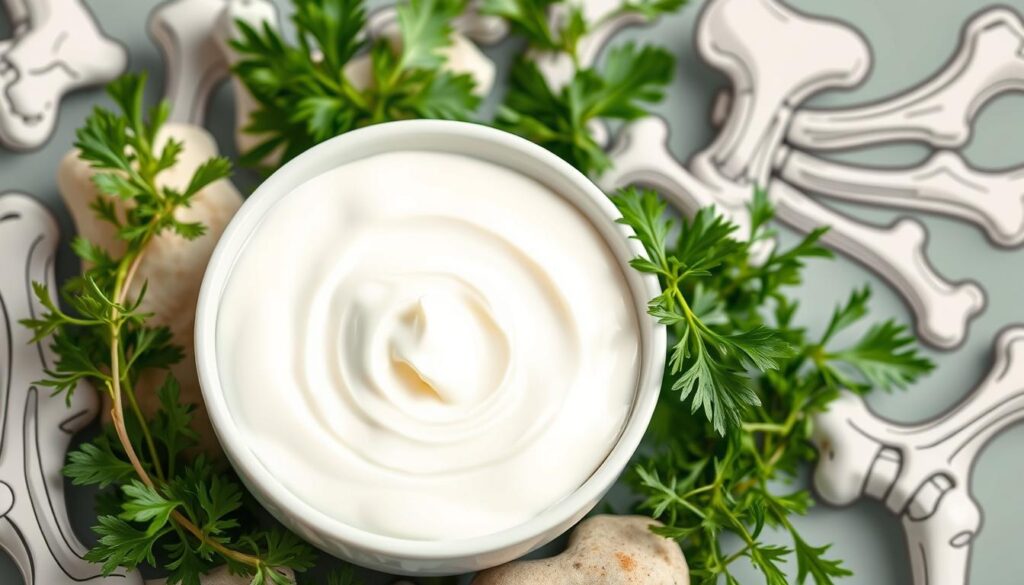Sour cream is a gem in the world of dairy products. It’s not just for its tangy taste and creamy feel. It also brings many health benefits that might surprise you.
But is sour cream really as good as it seems? Let’s find out why sour cream is worth a closer look.
Key Takeaways
- Sour cream is a rich source of essential vitamins and minerals, including calcium vitamin A vitamin B2, and vitamin B12.
- Regular sour cream is high in saturated fat but reduced-fat and fat-free options provide a healthier alternative.
- Sour cream may offer digestive and bone health benefits, making it a potentially beneficial addition to one’s diet.
- Sour cream can be a versatile ingredient in both sweet and savory dishes offering a unique flavor profile.
- While sour cream is generally safe for most people, those with lactose intolerance may need to consider alternatives.
Introduction to Sour Cream
Sour cream is a dairy product loved for centuries in many cuisines. It’s creamy and tangy, thanks to fermenting cream with lactic acid bacteria. This process makes it thick and flavorful. It comes from European and Middle Eastern cooking traditions and is now a common ingredient in many homes.
What is Sour Cream?
Sour cream is made by adding lactic acid bacteria to regular cream. This change makes the cream tangy and thick. A tablespoon 12 grams of full fat sour cream has 24 calories, 2 grams of fats and 1.2 grams of saturated fats.
History and Origins of Sour Cream
Sour cream’s history spans many cultures for centuries. It was traditionally made by letting cream ferment naturally. This created the lactic acid bacteria that give it its unique taste. Sour cream is key in dishes like goulash borscht, and Tex-Mex favorites like enchiladas and nachos.
Sour cream is a common topping for many dishes and a versatile ingredient in baking, getting mixed into batters and frostings for cakes and pastries.
Today sour cream is made through a controlled fermentation process. Modern sour cream is creamy and tart, with 18% to 20% butterfat. Some can have up to 25%.

Nutritional Value of Sour Cream
Sour cream is packed with nutrients both big and small. Knowing what’s in sour cream helps us see its good and not so good sides.
Macronutrients in Sour Cream
Sour cream is mostly fat. A cup has about 44 grams of fat with some being saturated. It also has about 6 grams of protein per cup.
Micronutrients in Sour Cream
Sour cream is a calcium powerhouse. One cup gives you almost half of what you need daily. It also has phosphorus riboflavin, and vitamin B12.
| Nutrient | Amount per 2 Tbsp Serving |
|---|---|
| Calories | 57 kcal |
| Total Fat | 5.82 g |
| Saturated Fat | 3.03 g |
| Carbohydrates | 1.39 g |
| Protein | 0.73 g |
| Calcium | 30.3 mg |
| Selenium | 1.11 mcg |
| Sodium | 9.3 mg |
| Vitamin A | 37.2 mcg |
| Vitamin B12 | 0.06 mcg |
| Vitamin K | 0.5 mcg |
The nutritional value of sour cream can change. This depends on the fat content and how it’s made. Always check the label to make smart choices.
Health Benefits of Sour Cream
Sour cream is more than just a tasty topping. It offers health benefits like supporting your digestive system and strengthening bones. Adding sour cream to your diet can boost your overall health.
Digestive Health Benefits
Sour cream contains probiotics, which are good for your gut. Studies show it may help with irritable bowel syndrome IBS and diarrhea caused by antibiotics. The live cultures in sour cream help keep your gut healthy, which is key for digestion.
Bone Health Benefits
Sour cream is packed with calcium and minerals important for strong bones and teeth. Eating sour cream may lower the risk of osteoporosis a condition of weak bones. The calcium phosphorus, and other minerals in sour cream support bone health.
| Nutrient | Percentage of Daily Value DV in 1 cup of Sour Cream |
|---|---|
| Calcium | 18% |
| Phosphorus | 14% |
| Vitamin B12 | 20% |
| Riboflavin | 30% |
| Vitamin A | 32% |
The table above shows the nutrients in sour cream that help with bone health.

Read more: How much protein is in 2 eggs
Sour cream also aids in weight management. Its protein helps you feel full, which can help control weight.
Does sour cream have any benefits?
Sour cream is a favorite dairy product with many health benefits. It’s packed with nutrients that help keep you healthy. It’s a great source of important nutrients for your body.
A two-tablespoon serving of sour cream has 57 calories. It also has 5.6g of fat, with almost 3g being saturated. It has 1.3g of carbs and 0.7g of protein. Its glycemic index is 56 making it a low to moderate glycemic food.
Sour cream is also rich in essential nutrients like calcium, phosphorus, and B vitamins. These nutrients are key for strong bones, good digestion, and overall health.
Studies show that sour cream’s probiotics can improve digestion. The live cultures in cultured sour cream support a healthy gut. This is vital for good digestion and nutrient absorption.
The protein in sour cream can also help with weight management. It can make you feel full and satisfied, helping you stick to a healthy diet.
Even though sour cream isn’t a big source of protein vitamins or minerals in one serving it’s still good for you. Its nutrient-rich profile and potential health benefits make it a great addition to a balanced diet when eaten in moderation.

Sour Cream and Weight Management
Sour cream might be key in managing weight because of its high protein. Studies show that eating protein rich foods like sour cream can make you feel full. This could lead to eating fewer calories and helping with weight loss.
The protein in sour cream also helps boost your metabolism and burn more energy. Plus, sour cream has calcium and other minerals that are good for your health. This supports a balanced diet which is great for keeping a healthy weight.
Sour cream is also packed with healthy fats. These fats can lower bad cholesterol and keep blood sugar levels healthy. The lactic acid bacteria in sour cream help your body absorb nutrients better by breaking down proteins and fats.
| Nutrient | Amount per 2 Tbsp 30g |
|---|---|
| Calories | 60 |
| Total Fat | 5g |
| Saturated Fat | 3.5g |
| Cholesterol | 20mg |
| Sodium | 15mg |
| Carbohydrates | 2g |
| Protein | 2g |
| Calcium | 40mg |
| Vitamin A | 200 IU |
Sour cream is a great choice for those trying to manage their weight. It offers healthy protein helps you feel full and supports your overall health. Adding sour cream to your diet can be a smart move for a balanced, weight conscious lifestyle.

Read more: Lose weight in 2026 without dieting 5 tricks
Sour Cream in Cooking and Recipes
Sour cream is a versatile ingredient for both sweet and savory dishes. It’s great on baked potatoes, chili, and in tacos. It adds a creamy tangy flavor to many recipes.
Versatile Uses of Sour Cream
Sour cream is more than just a topping. It’s also good in dips, sauces, and dressings. It brings a rich tangy taste. In baked goods it makes cakes, cookies, and quick breads moist and tender.
It can even replace milk or yogurt in some recipes. This makes sour cream a valuable addition to any kitchen. Sour cream recipes sour cream in cooking, and uses for sour cream offer endless possibilities.
| Sour Cream Recipes | Benefits of Sour Cream in Cooking |
|---|---|
| Sour Cream Mac and Cheese | Tenderizes gluten in baked goods |
| Sour Cream and Spinach Mini Pastries | Activates baking soda’s leavening powers |
| Sour Cream Burrito | Tempers the texture of cream cheese in cheesecake |

Read more: Low Carb or Low Fat What Works Best?
Sour cream’s acidity helps tenderize gluten strands in baked goods resulting in a more tender final product.
Sour cream adds moisture and richness to baked goods. It also enhances the flavor of savory dishes. Whether you’re looking for new sour cream recipes or just want to use it more it’s a great choice for delicious meals.
Choosing the Right Sour Cream
Choosing the right sour cream is important. You can pick between full fat and low fat options. Full fat sour cream is made from whole milk and has 18-20% fat. Low fat sour cream on the other hand is made with skim milk and has 4-5% fat.
Both types can be good for you, depending on your diet. Think about how much fat and calories you want. Also consider the recipe you’re using the sour cream in.
Full Fat vs. Low Fat Sour Cream
Full-fat sour cream is richer and creamier because it’s made with whole milk. Reduced fat sour cream has less fat, and nonfat or light sour cream has almost no fat.
The fat and calories in sour cream also affect its sodium. Sour cream with whole milk has more sodium than nonfat options.
| Sour Cream Type | Fat Content | Sodium Content |
|---|---|---|
| Full-Fat Sour Cream | 18-20% | Highest |
| Reduced Fat Sour Cream | 4-5% | Moderate |
| Nonfat or Light Sour Cream | Less than 5% | Lowest |
Think about your recipe and diet when choosing. Both full-fat and low-fat options can fit into a healthy diet.
Potential Downsides of Sour Cream
Sour cream has many health benefits but it also has some downsides. One major issue is for people with lactose intolerance. Sour cream has lactose, a sugar in dairy products. This can cause bloating gas, and diarrhea in those who are lactose intolerant.
But, some people with lactose intolerance might be okay with sour cream. The fermentation process can break down some lactose. It’s key for those with lactose intolerance to watch how their body reacts to sour cream. If they have bad reactions they should talk to a doctor.
Lactose Intolerance Concerns
- Sour cream contains lactose, which can cause digestive issues in individuals with lactose intolerance.
- The fermentation process used to make sour cream can break down some of the lactose, making it potentially more tolerable for some people with lactose intolerance.
- It’s important for those with lactose intolerance to monitor their individual reactions to sour cream and consult a healthcare professional if they experience any adverse effects.
| Potential Downsides of Sour Cream | Mitigation Strategies |
|---|---|
| Lactose intolerance | Fermentation can break down some lactose but individuals should still monitor their tolerance |
| Saturated fat and cholesterol content | Choose low fat or non-fat sour cream options, consume in moderation |
| Potential weight gain | Limit portion sizes balance sour cream consumption with a healthy diet and exercise |
Knowing the potential sour cream downsides helps people make better choices. This is especially true for those with lactose intolerance or other health issues. Talking to a doctor can offer great advice on enjoying sour cream safely.
Sour Cream Alternatives
Looking for dairy-free sour cream options? There are many plant based choices that taste and feel like the real thing. Soy coconut, and almond based varieties are great for those with lactose intolerance or who follow vegan or vegetarian diets.
Embracing Plant Based Sour Cream
Soy-based sour cream is a top pick for its similarity to dairy. It’s perfect for recipes toppings, and dips. Coconut-based options offer a creamy texture without dairy.
Nut-based alternatives like almond and cashew sour cream are creamy and tangy. They’re great for baked potatoes tacos, and more. These options let you enjoy sour cream without dairy.
| Plant-Based Sour Cream Alternative | Calories per 2 tbsp | Fat per 2 tbsp | Protein per 2 tbsp |
|---|---|---|---|
| Soy-based Sour Cream | 50-60 calories | 4-6 grams | 1-2 grams |
| Coconut based Sour Cream | 60-70 calories | 5-7 grams | 0-1 grams |
| Almond based Sour Cream | 35-45 calories | 3-4 grams | 1-2 grams |
| Cashew based Sour Cream | 45-55 calories | 4-5 grams | 1-2 grams |
These plant based options are not only for dietary needs but also healthier than dairy. They have less fat and calories.
Tips for Incorporating Sour Cream
Sour cream is a versatile ingredient that adds a creamy, tangy flavor to many dishes. It’s great for enhancing baked goods making delicious dips, and adding richness to savory meals. Here are some tips for using sour cream in your cooking and recipes:
- Topping for Baked Potatoes Chili Tacos, and Nachos: Sour cream is a tasty topping for baked potatoes chili tacos, and nachos. It adds a tangy flavor that complements the other ingredients.
- Baking with Sour Cream: Sour cream adds moisture and richness to cakes cookies, and quick breads. It helps create a tender fluffy texture in baked goods.
- Sauces Dips, and Dressings: Sour cream is great for making creamy sauces dips, and dressings. It’s a good alternative to mayonnaise or cream cheese in many recipes.
- Soups, Stews, and Casseroles: Adding sour cream to soups stews, and casseroles enhances their creaminess and flavor.
- Healthier Substitutions: Sour cream can be used as a healthier substitute for high-fat ingredients like mayonnaise or cream cheese in many recipes.
By using sour cream in your cooking and recipes, you can add a delicious tangy flavor and creamy texture to many dishes. Whether you’re topping baked potatoes baking with sour cream or using it in sauces and dips this versatile ingredient can elevate your culinary creations.
| Dish | Sour Cream Usage | Benefit |
|---|---|---|
| Baked Potatoes | Topping | Adds creamy tangy flavor |
| Cakes and Cookies | Baking Ingredient | Provides moisture and richness |
| Dips and Dressings | Main Ingredient | Creates creamy texture |
| Soups and Casseroles | Stirred In | Enhances creaminess and flavor |
| Substitutions | Replacing High-Fat Ingredients | Healthier Option |
Sour cream is a versatile ingredient that can elevate the flavor and texture of a wide range of dishes from baked goods to savory meals.
Conclusion
Sour cream is a nutrient-rich dairy product with many health benefits. It supports digestive health and strengthens bones. It may also help with weight management.
However those with lactose intolerance should be careful. Sour cream is great for many adding flavor to both sweet and savory dishes.
Knowing the nutritional value and benefits of sour cream helps in making better choices. It supports gut health strengthens bones, and aids in weight control when eaten in moderation.
Sour cream is a nutritious addition to a healthy lifestyle. It’s important to consider personal dietary needs and sensitivities. Understanding sour cream and its health effects helps in making informed choices for a balanced diet.





